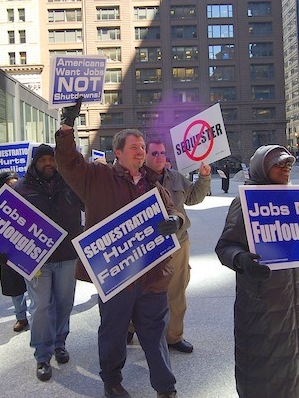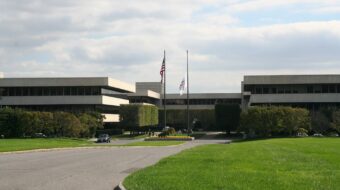
ST. LOUIS – “Our message is clear,” J. David Cox, international president of the American Federation of Government Employees (AFGE) said, “sequestration will have a tremendous negative impact, not only on our members, but on all Americans.”
“Eventually, everybody will feel the pain,” Cox added.
Cox, with about 250 AFGE members and supporters, rallied outside Republican U.S. Senator Roy Blunt’s office here March 20 to protest the $85 billion in across-the-board cuts to vital social services and the military, known as sequestration.
While Blunt has supported amending sequestration to protect meat and poultry inspectors from furloughs, this is largely seen as an attempt to placate agribusiness as there are 148 meat and poultry facilities in rural Missouri. Under the terms of sequester, every meat, poultry and egg processing facility in the country could be forced to shut down for two-weeks between April and October, cutting into their profits. These facilities also employ thousands of people – and thousands of voters.
AFGE wants Blunt to support repealing sequestration, and raise taxes on the wealthy and corporations to help pay-down the federal budget deficit, not furlough federal employees, especially in this weak economy.
The protest was one of more than 150 rallies that took place all across the country led by AFGE and the AFL-CIO.
AFGE represents about 700,000 federal employees nationwide, and according to Cox “about 500,000 of them are subject to furloughs,” including about 10,000 in the St. Louis area.
“Sequestration is bad for our country and for our economy,” Cox continued. “The government needs to be creating more jobs, not less.”
Randy Kiser, Midwest AFL-CIO field organizer, said, “Continuing tax breaks for the wealthy, while forcing hard working federal employees to go on furlough is outrageous.”
According to the union, most of their members will face up to 22 days of unpaid furlough.
“Forcing hardworking Americans to take pay cuts will have a direct impact on our local economy,” said Steven Hollis, president of AFGE Local 3354 here in St. Louis.
“Less money in their pockets means less money to spend locally on food, clothing, rent and other goods and services,” Hollis continued. “Our elected officials should work together to strengthen our still-shaky economy, not pull the rug out from under local businesses and undermine recovery.”
According to Cox, sequestration will impact “planes on the runway, air traffic controllers, sanitation and inspection workers and our veterans. This isn’t just about us.”
AFGE members include employees in the following agencies: Department of Defense, Department of Veterans Affairs, the Social Security Administration, the Transportation Security Administration and the Department of Justice.
“If federal employees are furloughed without pay, if offices and plants are shut down, if vacancies aren’t filled because of these across-the-board budget cuts, then federal employees won’t be able to do the work that the American public expects them to do,” Cox added.
As union members and their supporters rallied, they chanted, “Sequestration has got to go! We don’t want no furlough!”
Martin Rafanan, co-chair of the St. Louis Jobs with Justice Workers’ Rights Board, said, “Sequestration will impact the entire community by cutting essential services. People rely on these vital services. The least among us will suffer the most.”
“These workers are standing up for the entire community, and we need to support them and stand with them,” Rafanan concluded.
Photo: Federal workers and supporters protest in Chicago, March 20, against the forced automatic budget cuts known as sequestration. (PW/Earchiel Johnson)












Comments